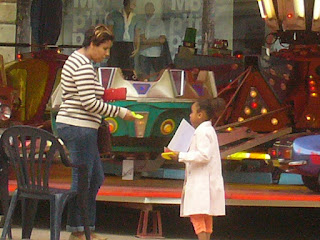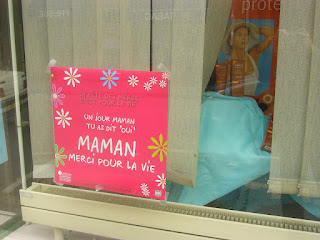
Subway, St. Suplice
The Voyage (to Maxim du Camp)
"For children crazed with maps and prints and stamps –
The universe can sate their appetite.
How vast the world is by light of lamps,
But in the eyes of memory how slight!
One morning we set sail, with brains on fire,
And hearts swelled up with rancorous emotion,
Balancing, to the rhythm of its lyre,
Our infinite upon the finite ocean."
Charles Baudelaire


It starts like this, usually
It begins to become obvious in Breteuil and St. Leu; after Fontainebleu, in Montargis, Briare, Nevers and Moulins it is the norm. There are no women between 22 and 40 on the streets or in the cafés, eating in restaurants - who do not have a child.
Children.
Thus, bars are full of older school kids, a few students; most are already paired-off, they hold tight to what they’ve got. In Nevers this came to a head: for here is a busy country town where the ideas of Sartre or De Beauvoir count for diddly rien. At the Grand Café the day is full of family, which means a constant drifting of daughters and mothers, children and fathers. Eating, drinking; and inside there is no music – not any all evening, not even the crowd-pleasing Rebel Yells, of – yes, even Paris. Saturday Night’s All Right for Talking here.

"In solitary uplands far away
Betwixt the blossoms of a rosy spray
Dreaming upon the wonderful sweet face,
Of Nature, in a wild and pathless place"
Tennyson Sonnet

De Beauvoir loved walking on her own in the country; it was, after Sartre and writing, her great joy. Given Startre's sack-track record, it makes sense.
What is so interesting about these places is how the young, middle and old integrate. It is like watching a family – En Famille - from a distant planet where boredom, attention deficit disorder, obesity, and “bling” have all been eradicated. Perhaps these things are all on their way, coming with the wi-fi; waiting just around the corner to becalm the contentment of these towns. In Breteuil I stumbled on the Burgher Roi, but here – if they exist, which they must – they are just part of the life.

Schools seem thriving, and in the one I saw in Abbeville, incredibly well stocked. Lively, but not threatening. Happy even.
The main café in Nevers is a good example of community; I checked online and by phone with English and Americans: where are such “nodal” points in stolid, solid, Middle England or America? They don’t exist, we drive. We stay in our chateau. We watch the flatscreen.

It is sunny, there is another electrical storm; France play Ukraine in an important Euro 2008 qualifier (there is a flat screen inside, muted, and barely three people watching it. When, very late, 11pm, Nicolas Anelka scores the second goal, there is a quiet whoop from about four people.) There are drinks, meals, conversation and flirtation - with the young.

“I knew what had worked for me in France. It wasn’t just that I had had access to a slew of government-run-or-subsidised support services it was also that I’d had a whole unofficial network of people to help and support me – materially and emotionally – as I navigated the world of motherhood…”
Perfect Madness: Motherhood in the Age of Anxiety. Judith Warner

There are mothers everywhere, perhaps this is just the way of smaller towns, but it is the calm of it all that surprises after seeing “family” in any major city. There are streets to wander, pursuing a surrealist dream here – it is just that they come back to a centre, and at that centre there are people to meet and catch up with, grandmothers, fathers and kids. Being a stranger here isn’t a bad thing, there is no cowboy on the edge of town atmosphere, it is just that we are superfluous to the needs of anyone. Though our tourist revenues undoubtedly help.
“I was not naïve enough to think that, economically or politically, we could adapt (sic) the French system here [in the USA], but I did believe that we could learn much from its psychology: that if you support mothers materially, you support them emotionally, and this support translates into much lower lever of anxiety, and a much greater level of mental freedom. I knew there was a kind of existential safety to be derived from a world in which there were structures in place to help you take care of your children: Day-care centres that had guaranteed standards of quality. State schools whose early-education programmes were a source of national pride…reasonably prices…babysitters…And there was much inspiration to be gleaned from a culture in which the needs of a mother were considered every bit as central to family happiness as the needs of the child.”

At eleven, then midnight – as the café moves to the fun-fair across the square, families stay together, children aren’t crying. One does nurgle when Anelka scores, but – hell, why not? The centre stays – it doesn’t drive away.
When Judith Warner asked mothers in Washington about the idea of society helping they snarled “Do you want the federal government raising your children?”
I reckon the answer might just be yes – with the French Federal government. Now that would be interesting.

to be so continued...
No comments:
Post a Comment